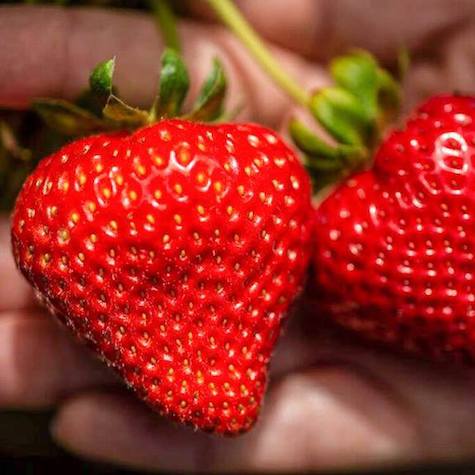Strawberry Varieties
Day Neutral Varieties
Day-neutral strawberries will continue to set and ripen fruit all summer long until a hard frost puts them into dormancy. Day-neutral refers to the light sensitivity of the variety. Day-neutral strawberries will blossom and set fruit no matter how long or short the days are. Today there are several excellent varieties of day-neutral strawberries and they are a wonderful choice for the gardener who wants a steady supply of fruit instead of having it all ripen at the same time.
Sweet Ann – LCN
Sweet Ann is a vigorous plant with high productivity and exceptional flavor.
The attractive fruit is large in size, with a beautiful long conical shape. It has medium firmness with a good acid-sugar balance and very sweet taste. Sweet Ann is a glossy red color both inside and out. The variety produces few runners in the fruiting field.
Sweet Ann seems quite disease resistant to everything but fusarium wilt. It is an excellent choice for the organic production systems.
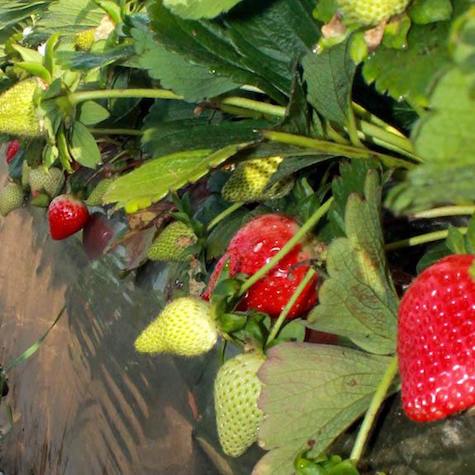
Albion – UC
The gold standard of the industry in terms of flavor, Albion is a day-neutral (ever-bearing) cultivar. “Albion” is resistant to Verticillium wilt (Verticillium dahliae) and Phytophthora crown rot (Phytophthora cactorum), and relatively resistant to Anthracnose crown rot (Colletotrichum acutatum).
When treated properly, Albion has tolerance to two-spotted spider mites (Tetranychus urticae). Fruit from “Albion” is typically long, conical, and very symmetrical. Albion fruit is firm and is dark red inside and out.
Albion fruits consistently throughout the season. One downside of this variety is that it produces a lot of runners that must be cut in order to maintain high production.

Cabrillo – UC
Cabrillo is a moderately strong flowering variety that is adaptable to both winter & summer plantings. Fruit size and firmness is comparable to that of Albion, as well as San Andreas with greater individual plant yields and offers outstanding flavor.
Disease resistant to powdery mildew, verticillium wilt, phytophthora crown rot, as well as common leaf spot, and with proper treatment can be tolerant to two-spotted spider mite. But, is susceptible to Anthracnose Crown Rot.

Monterey – UC
Monterey is moderate in day-neutrality, slightly stronger flowering than Albion with a similar production pattern. It is a vigorous plant and may require slightly more space than Albion. This variety does well in organic applications.
The fruit from Monterey is slightly larger but less firm than fruits from Albion. Post-harvest traits for Monterey are similar to those for Albion. Monterey has outstanding flavor with a distinct sweet aftertaste that is unique among California cultivars.
Monterey has a good disease resistant profile, although it is susceptible to powdery mildew (Sphaerotheca macularis).
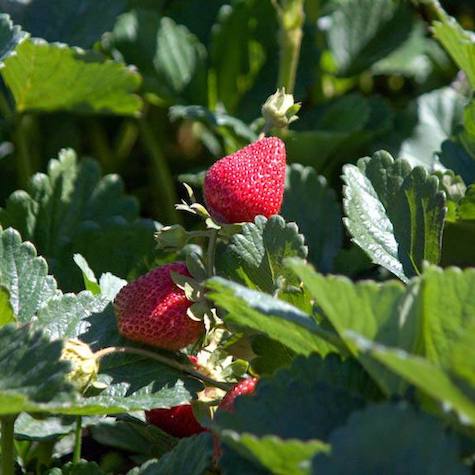
Portola – UC
Portola is a strong day-neutral cultivar with broad adaptability. This cultivar can be used in standard winter planting systems, where it initiates fruiting slightly earlier than Albion to initiate. Due to a strong flowering response, Portola is especially well adapted to spring and summer planting systems.
Portola is a vigorous plant and may require a slightly lower plant density than Albion. The fruit for Portola is similar in size to Albion but lighter in color and somewhat shinier. Post- harvest characteristics for Portola are similar to those for Albion although it is slightly less tolerant to rain.
Fruit flavor for Portola is excellent and especially consistent throughout the fruiting season. Portola has a good disease resistance profile.
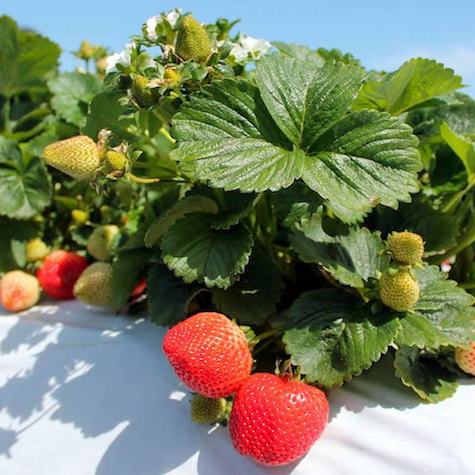
Royal Royce – UC
Royal Royce is a new generation day neutral from UC Davis. Royal Royce produces huge yields over a full season. In controlled tests, Royal Royce has produced 77% higher yields than a comparable San Andreas. This cultivar has also shown reduced runner production in fruiting fields.
Royal Royce berries are firm, producing larger fruit than San Andreas. Disease resistance is equal to a Monterey. Low acidity.
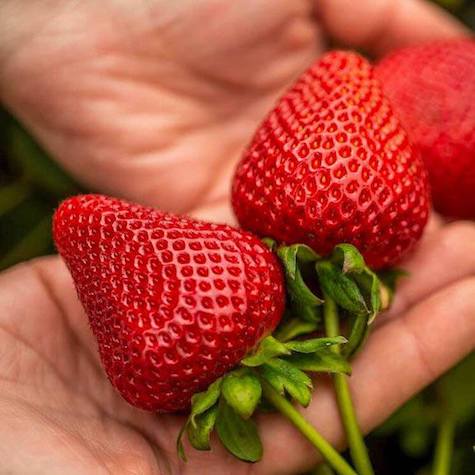
San Andreas – UC
San Andreas is a moderate day-neutral with a production pattern very similar to Albion. Plant vigor for San Andreas is somewhat higher than for Albion early in the season but plant size throughout the fruiting season is similar to Albion due to its high and consistent productivity. This cultivar produces few runners in the fruiting field. The fruit for San Andreas is exceptional in appearance and especially superior to Albion early in the season.
The fruit color for San Andreas is slightly lighter than for Albion and it has similar post-harvest characteristics. The flavor of San Andreas is outstanding similar to Albion. San Andreas has a good disease resistance profile with no outstanding cautions. Its typically high-quality fruit early in the season, together with a low chilling requirement, make this a good candidate cultivar for Southern California. Fruit productivity for San Andreas is similar to or slightly below that for Albion.
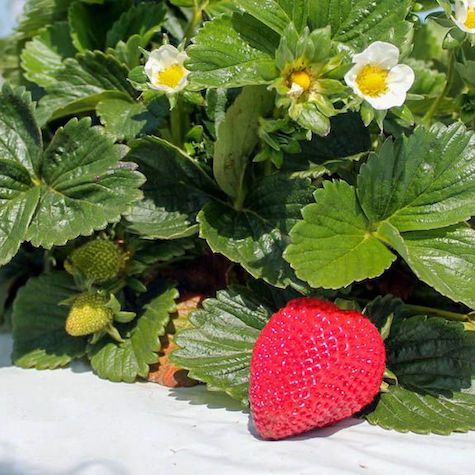
Seascape – UC
Seascape is a dependable standard in the strawberry industry. It was bred for tolerance to many of the common viral diseases in California, but has demonstrated susceptibility to common leaf spot.
Seascape fruit is large and flavorful with an attractive glossy finish. Seascape also has flexibility in planting requirements, such that it does not require as much chill hours to set fruit, which makes this suitable for warmer climates.
Seascape produces large berries with excellent flavor over a long season, but is concentrated in late spring with high yields in the fall.
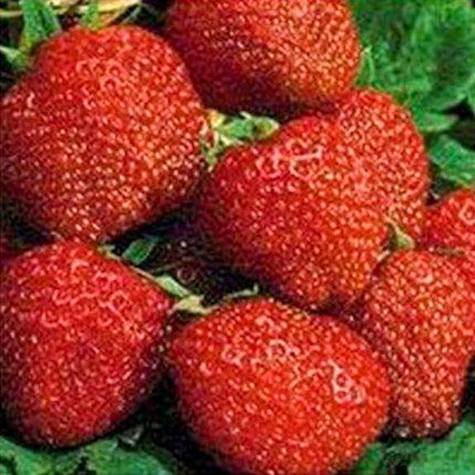
Valiant – UC
Valiant is a new generation Day Neutral variety from the UC Davis breeding program.
Valiant shows potential for big early season production, yielding roughly 68% higher yields than a comparable San Andreas.
Valiant berries are exceptionally firm. Valiant is a vigorous plant, with fruit size around 35 grams. Disease tolerance is similar to a Monterey. Low Acid.
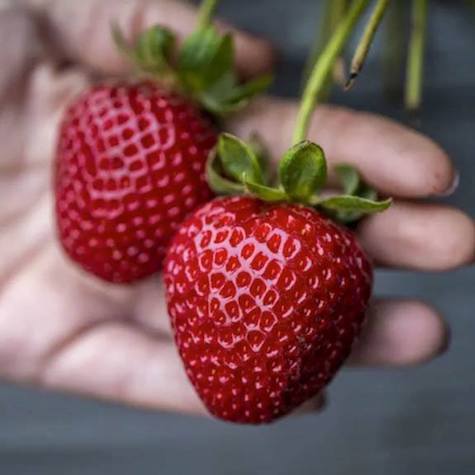
Short Day “June Bearing” Varieties
Short day or “June Bearing” strawberries produce a single, large crop per year during a 2 – 3 week period in the spring. June bearers are the traditionally grown plants, producing a single flush of flowers and many runners. They are classified into early, mid-season and late varieties. The largest fruits are generally from June bearing varieties.
Ruby June – LCN
Ruby June is gaining a reputation as a plant that produces consistently sweet and tasty berries, perfect for the southeast United States. Between Lucia, Ruby June and Scarlet, Ruby June is the strongest short-day variety that is more compact and has tighter plant architecture and leaf structure than Lucia and Scarlet.
Ruby June has the darkest exterior and interior color of any of Lassen Canyon’s varieties. The fruit is great for recipes calling for strawberries. Plus, Ruby June has rated very high with our in-house taste panel.
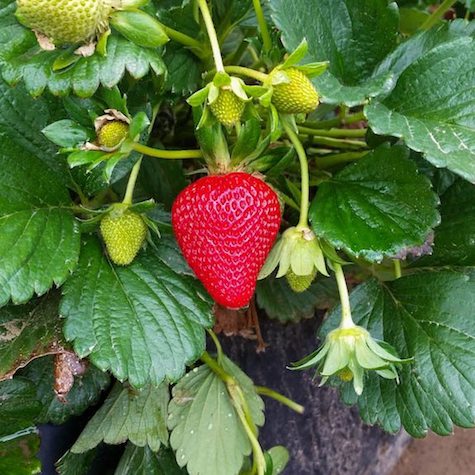
Sierra – LCN
Sierra is a new short-day variety bred by Lassen Canyon Nursery. The ‘Sierra’ variety can be characterized as moderate vigor plants that produce attractive, conical fruit. ‘Sierra’ berries also contain a sweet strawberry flavor.
Sierra berries exhibit a desirable light red exterior, making them especially attractive for fresh market production. The fruit of ‘Sierra’ ripens nearly up to the calyx and there is no unripe shoulder. In addition, the variety is fully remontant in cool coastal areas of California, producing high-quality fruit all season long.
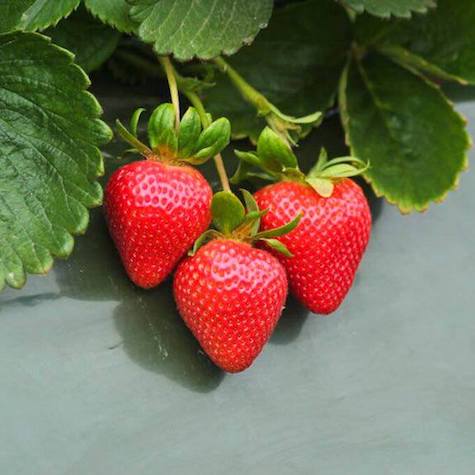
Stella – LCN
An early heavy producer, Stella has large fruit and is dark red inside and out.
It has a uniformly conic shape throughout its production cycle. The fruit is very sweet, aromatic, and firm but not crunchy.
This variety is heat & rain tolerant but does downsize late in the season. It does have a high nitrogen requirement.

Camarosa – UC
Camarosa is an early short day variety. This vigorous plant produces large to very large firm fruit throughout most of its fruiting cycle. Interior color of Camarosa is a brilliant red and fruit colors uniformly.
Yield potential is high to excellent.
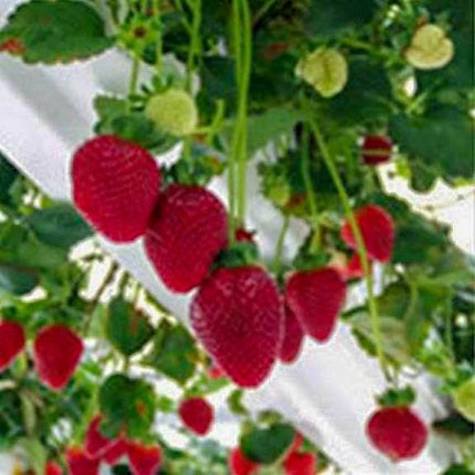
Camino Real – UC
Camino Real is a short-day cultivar similar to Camarosa in all aspects including production pattern. It is somewhat later to initiate fruiting with most cultural treatments, however.
External and internal fruit color for Camino Real is darker than Camarosa. Subjectively, Camino Real has very good flavor. The fruit is outstanding for both fresh market and processing.
Camino Real is susceptible to common leaf spot and sensitive to powdery mildew. It is resistant to Verticillium wilt, Phytophthora crown rot and somewhat resistant to Anthracnose crown rot. When treated properly it shows tolerance to two-spotted spider mite.
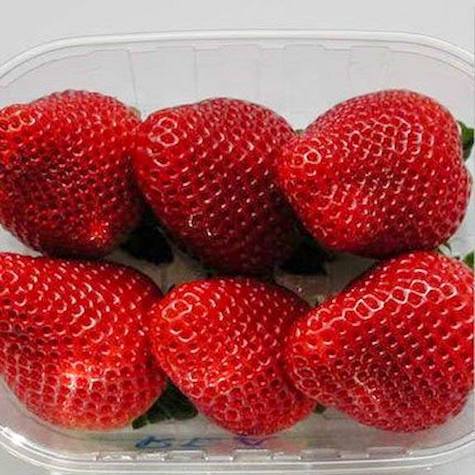
Chandler – UC
Chandler continues to be one of the “go to” varieties for roadside strawberry stands, backyard gardeners everywhere and many commercial growers in the southeast.
Chandler produces semi-early delicious sweet fruit. Fruit size is medium to large and medium in firmness. Chandler performs well in the east and is well adapted to the south.
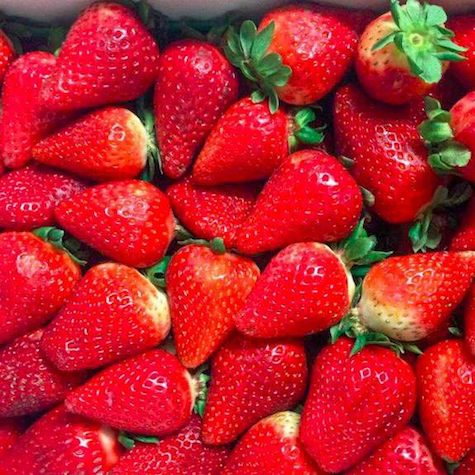
Festival – UF
Florida Strawberry Festival is a short day cultivar. Its fruit is mostly conic in shape. The external color of a mature fruit is deep red and glossy. The internal color is bright red. Strawberry Festival fruit has a very firm texture and excellent flavor.
Strawberry Festival has a fruiting pattern and yield similar to that of Camarosa.
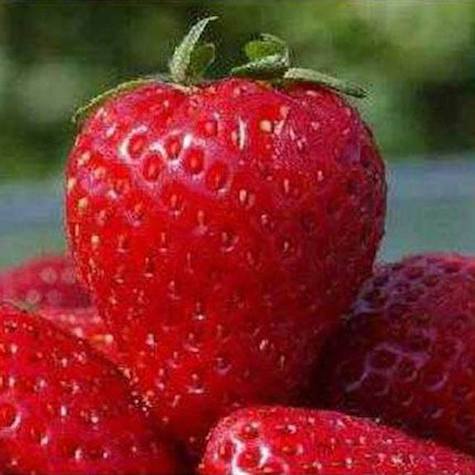
Fronteras – UC
Fronteras is a short day variety, meaning it responds to day length, produces the bulk of its fruit in the shorter days of spring and fall, and is adapted to the fall planting and winter production system of the California coast.
Fronteras is a large and vigorous plant, more so than the short day variety Ventana in use for many years by growers.

Hood – USDA
Hood is a pacific northwestern variety characterized by fruit borne well above the soil on strong, upright clusters.
The berry is large, round and conic. The skin is glossy bright medium red. The berries are firm with a pleasant flavor.
The fruit ripens midseason. This is a nice variety for preserves and jams.
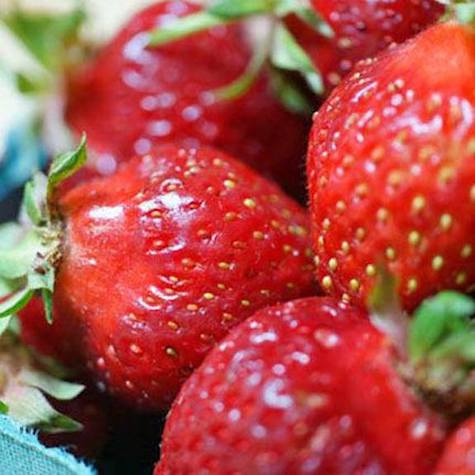
Marys Peak – USDA
A Pacific Northwest variety from USDA-ARS (Oregon) that was collaboratively developed with OSU and WSU researchers.
High yields and an upright growth habit for easier picking for either market (Fresh or Processing).

Medallion – UF
A high quality variety released out of the University of Florida, Medallion is a short day with intense flavor that offers medium red color, gloss, and firmness. Growth pattern is more compact with low runner production, but will require more nutrients for optimum yields.
Also needs a heavier wet soil composition. A dry non organic soil mixture will cause difficulties in growing. Medallion is susceptible to charcoal rot.

Radiance aka Fortuna – UF
This strawberry cultivar has high early-season yields and good fruit size throughout the main production period in Florida and southwest Spain.
The fruit is a glossy bright to dark red, easy to harvest, and has a smooth appearance. The flavor is acceptable and can be quite good under ideal growing conditions. Radiance fruit is firm yet juicy and sports an attractive calyx.
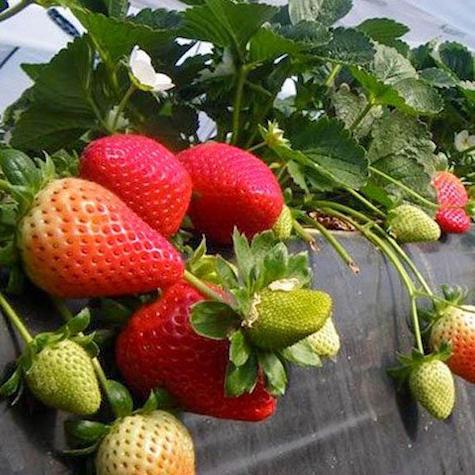
Sweet Charlie – UF
Developed in Florida, Sweet Charlie is an early sweet variety.
The plant is medium in size making harvest easy.
Sweet Charlie has anthracnose tolerance and does well in southern states and in China.
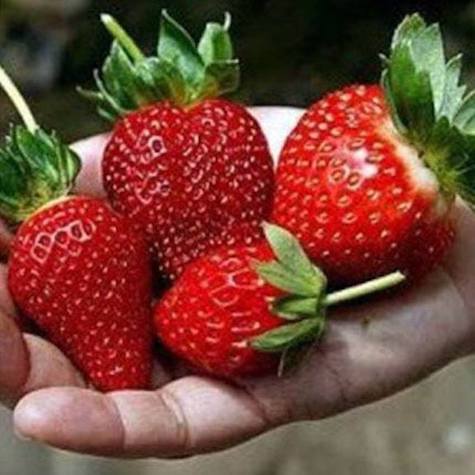
Tillamook – USDA
A high-yielding, large-fruited, mid-season cultivar with very high fruit quality that is suited to the fresh and processed markets. The ripe fruit are visible in the canopy and easy to pick. The fruit is very firm and has a very good fresh flavor.
Plants of Tillamook are vigorous and hold up well into the second harvest season suggesting some virus tolerance. Tillamook has good processing characteristics. The most outstanding characteristics of Tillamook are its high yield and very large attractive, high quality fruit.
Tillamook will be an excellent cultivar for local fresh market sales, pick-your-own and for processing.
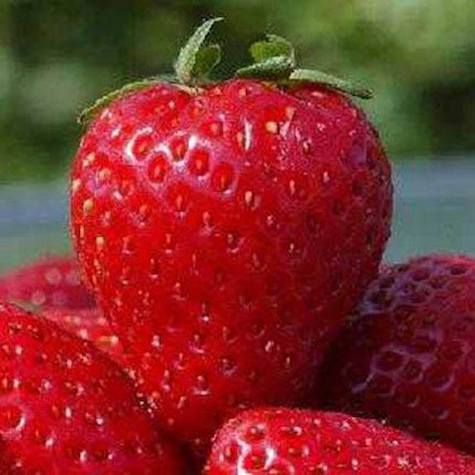
Victor – UC
Victor is a new release from the UC Davis breeding program. Victor is a short day variety that yields fruit in the mid-late season. Victor has shown to have 45% higher yields than a comparable Petaluma. Victor berries are ‘exceptionally’ firm.
Victor plants are compact. This cultivar shows good resistance to Fusarium & Phytophthora.
